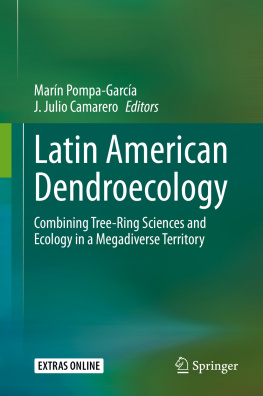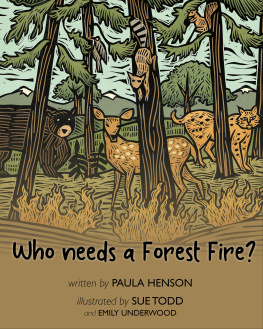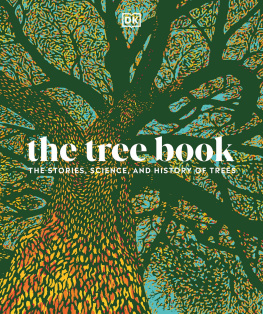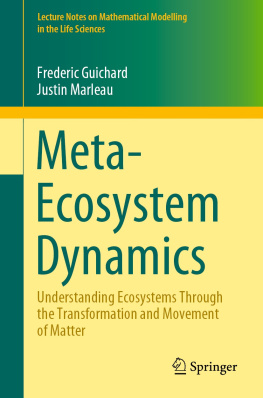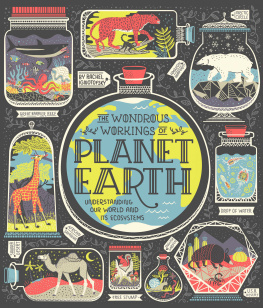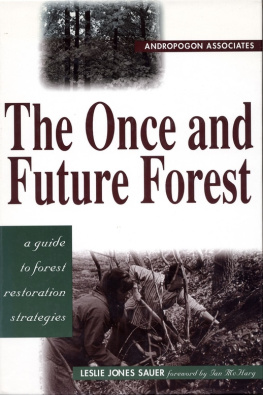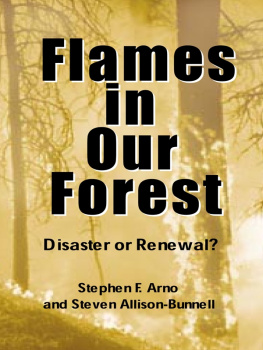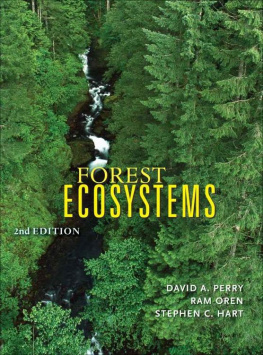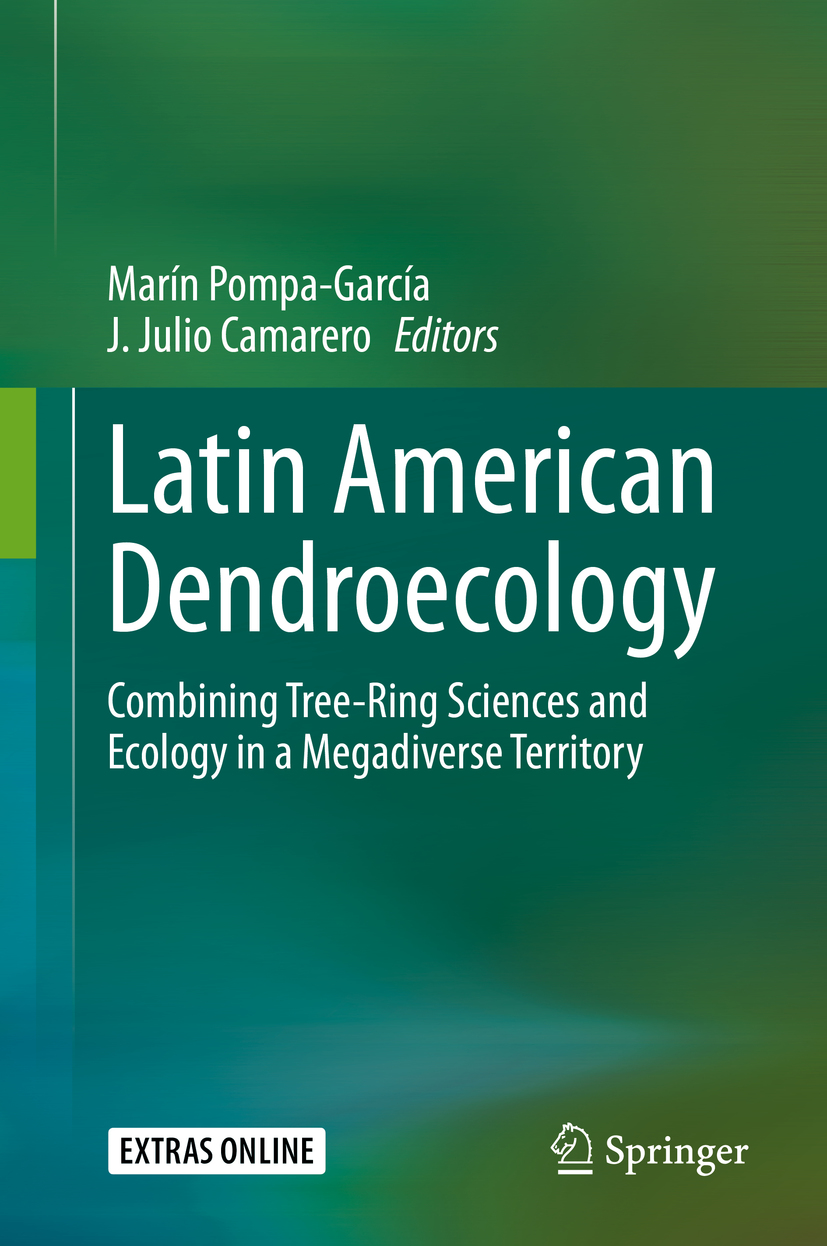Editors
Marn Pompa-Garca and J. Julio Camarero
Latin American Dendroecology
Combining Tree-Ring Sciences and Ecology in a Megadiverse Territory
Editors
Marn Pompa-Garca
Facultad de Ciencias Forestales, Universidad Jurez del Estado de Durango, Durango, Mexico
J. Julio Camarero
Instituto Pirenaico de Ecologa (IPE-CSIC), Zaragoza, Spain
ISBN 978-3-030-36929-3 e-ISBN 978-3-030-36930-9
https://doi.org/10.1007/978-3-030-36930-9
Springer Nature Switzerland AG 2020
This work is subject to copyright. All rights are reserved by the Publisher, whether the whole or part of the material is concerned, specifically the rights of translation, reprinting, reuse of illustrations, recitation, broadcasting, reproduction on microfilms or in any other physical way, and transmission or information storage and retrieval, electronic adaptation, computer software, or by similar or dissimilar methodology now known or hereafter developed.
The use of general descriptive names, registered names, trademarks, service marks, etc. in this publication does not imply, even in the absence of a specific statement, that such names are exempt from the relevant protective laws and regulations and therefore free for general use.
The publisher, the authors, and the editors are safe to assume that the advice and information in this book are believed to be true and accurate at the date of publication. Neither the publisher nor the authors or the editors give a warranty, expressed or implied, with respect to the material contained herein or for any errors or omissions that may have been made. The publisher remains neutral with regard to jurisdictional claims in published maps and institutional affiliations.
This Springer imprint is published by the registered company Springer Nature Switzerland AG
The registered company address is: Gewerbestrasse 11, 6330 Cham, Switzerland
Foreword
Trees and shrubs of Latin America from Mexico to Tierra del Fuego are critical sensors of the environment, recording key data in their growth rings about climate, disturbance, hydrology, human impacts, and chemical composition of the atmosphere and soils. Interpreting these rich data sets is a major challenge of our times as scientists, policymakers, and resource managers seek solutions for urgent problems of climate change and population pressures on the environment. This volume brings together expertise in tree-ring research applications across Latin America, highlighting the advances made by dendrochronologists of the region and their global partners. It is a welcome addition to the growing literature from this biologically and culturally valuable region.
I have had the privilege of carrying out dendroecological research in Mexico with many collaborators for several decades. In past years, tree-ring research was quite limited in Latin America. Pioneering scientists and laboratories, well represented in this book, have dramatically advanced the state of the science. The editors of this book, Marn Pompa-Garca and J. Julio Camarero, are two of these leading researchers who bring tree-ring expertise from within and outside the Latin American region. They have attracted contributions from well-established tree-ring laboratories as well as from new investigators.
The pace of global change is swift, and science must advance quickly to provide useful information for society. Latin American ecosystems have been woefully understudied, but new frontiers are being opened every day as new species and new ecological themes are being studied. I hope that this book proves to be useful to researchers seeking new tools for understanding ecological dynamics in the interests of conserving the high biodiversity and critical ecosystem services of Latin America. Adapting to shifting climate and sustaining the environment are essential for the growing population, already 650 million people, of the region. There are important implications outside the regional borders as well. Studies in genera such asNothofagusandAraucariareported here may be useful in closely related Southern Hemisphere ecosystems across the Pacific Ocean in Australia or New Zealand. Investigation ofJuniperus deppeanaandPinus strobiformis, described here, is relevant to research and management of these species north of Mexico in the United States. Finally, I hope that the frontier of studying dendrochronological potential in wet tropical tree species, another topic of this volume, serves as inspiration for other researchers in the tropics of the Americas, Africa, and Asia.
Peter Z. Ful
Preface
Dendroecology has emerged as a scientific discipline that improves our knowledge of the ecological processes faced by individual trees and forests. Recent efforts have been devoted to studying the application of tree rings to ecological problems. Specifically, the bookDendroecology: Tree-Ring Analyses Applied to Ecological Studies, whose scientific relevance motivated the interest of the international scientific community, was published in 2017.
In Mexico, the dendroecology network ( https://dendrored.ujed.mx/ ) emerged as a platform linked to international researchers, supporting and encouraging the application of tree rings to ecological changes of forest ecosystems. Many scientific products have been generated under this discipline as scientific articles, congresses, conferences, books, human resource trainings, academic exchanges, etc., providing knowledge of the frontier in forest ecology. Activities within this network motivated authors to develop and write this book on dendroecology in Latin America.
Latin America constitutes a strategic region where the convergence of diverse climates, topographical conditions, soil types, and physiographies creates many types of biomes rich in biodiversity. Such abundance of tree species, many of them with dendrochronological potential, constitutes an ideal opportunity to increase their ecological knowledge in response to environmental stress, which are often threatened by anthropogenic threats including climate change. In this region, the historical interactions between human societies and the environment were also rich and diverse, albeit they are converging under the current globalization scenario, pushing some ecosystems toward their sustainability thresholds.
This book aims to fill a knowledge gap by addressing ecological problems under a dendroecological approach through applications in a wide biogeographic range including tropical and temperate forests from northern Mexico to southern Chile. It is organized according to five broad topical themes, including an Introduction; Ecological Drivers of Tree Radial Growth (Part I); Dendroecology in Neotropical Regions (Part II); Forest Dynamics, Climate, and Disturbances (Part III); and Forest Management and Conservation (Part IV). Each theme is composed of chapters (16 total) highlighting recent applications in dendroecology that often show novel methods and approaches.
Part I: Ecological Drivers of Tree Radial Growth
In Chap., Rodrguez-Ramrez and Luna-Vega showed that xylem vessels can be used to detect anatomical variations in endangered species such as Mexican

